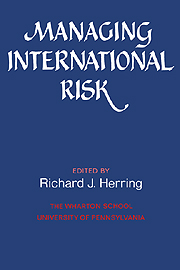 Managing International Risk
Managing International Risk Published online by Cambridge University Press: 07 May 2010
I would like to comment on several key points of Professor Vernon's excellent treatment of the topic of risk, drawing on the experience of my company in responding to risk and drawing on the behavior pattern of others in the oil and petrochemical industries. The decade of the 1970s was not kind to the international competitive stance of the U.S. companies. As a result of the problems we encountered, thinking globally is no longer an option for corporate management. It is now essential, not only for the health of the corporation, but also, in some cases, for survival.
The first example I will examine is an organizational response to a raw material supply interruption: the oil embargo of 1973. This event brought with it a new regime of hydrocarbon economics and new dimensions of risk to the oil and petrochemical industry and to the total economy. What was the needed organizational response? It was twofold: first, to determine ways of managing the risk of supply interruptions of the raw material on which our industry is based, and second, to deal creatively with a complex international situation. Security of hydrocarbon supply became the number one corporate objective.
Our institutional response to this risk was to seek out arrangements with an oil-rich country, Saudi Arabia, which has the largest oil reserves in the world. During the early period after the embargo, my company began negotiations with the kingdom of Saudi Arabia. Our objective was to secure entitlements to purchase crude oil by entering into a joint venture to build a petrochemical complex.
To save this book to your Kindle, first ensure [email protected] is added to your Approved Personal Document E-mail List under your Personal Document Settings on the Manage Your Content and Devices page of your Amazon account. Then enter the ‘name’ part of your Kindle email address below. Find out more about saving to your Kindle.
Note you can select to save to either the @free.kindle.com or @kindle.com variations. ‘@free.kindle.com’ emails are free but can only be saved to your device when it is connected to wi-fi. ‘@kindle.com’ emails can be delivered even when you are not connected to wi-fi, but note that service fees apply.
Find out more about the Kindle Personal Document Service.
To save content items to your account, please confirm that you agree to abide by our usage policies. If this is the first time you use this feature, you will be asked to authorise Cambridge Core to connect with your account. Find out more about saving content to Dropbox.
To save content items to your account, please confirm that you agree to abide by our usage policies. If this is the first time you use this feature, you will be asked to authorise Cambridge Core to connect with your account. Find out more about saving content to Google Drive.